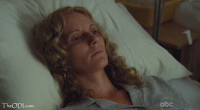I watched LOST tonight with a bit of a delay, as my TV is on the fritz. Fortunately I was able to record it and then watch it on the computer screen. If you haven’t watched the episode yet, this post contains spoilers.
 The episode “Jughead” has so much that makes LOST great in it, including moments of human joy (for instance, the birth of Desmond and Penny’s son Charlie) as well as answers to mysteries (we now know that Richard is “really old”, and that John Locke sets in motion the events that will eventually lead to the presence of Richard Alpert at his birth and at other points during his life). But the best moment is when John Locke, back in 1952, gets to meet Charles Widmore, who is at that point one of the Others! In another scene, the older Widmore tells Desmond that he should not get mixed up in these things, which go back many years. He also tells Desmond that Faraday’s mother is in Los Angeles and is a “very private person”.
The episode “Jughead” has so much that makes LOST great in it, including moments of human joy (for instance, the birth of Desmond and Penny’s son Charlie) as well as answers to mysteries (we now know that Richard is “really old”, and that John Locke sets in motion the events that will eventually lead to the presence of Richard Alpert at his birth and at other points during his life). But the best moment is when John Locke, back in 1952, gets to meet Charles Widmore, who is at that point one of the Others! In another scene, the older Widmore tells Desmond that he should not get mixed up in these things, which go back many years. He also tells Desmond that Faraday’s mother is in Los Angeles and is a “very private person”.It sounds like they are gearing up to reveal that Eloise Hawking is Daniel Faraday’s mother. But that will create an interesting situation, since that will mean that Faraday’s mother is working with Ben while Widmore has been funding her son’s research. Things get still more complex when we consider that Hawking seems to consider Desmond important, and yet Ben wants to kill Penny – who is Desmond’s constant, and whose death would presumably lead to Desmond’s!
What makes LOST great is that it has an element of the mysterious – at times at least trying to be scientific, at times seeming perhaps supernatural – but it centers around human characters that viewers can come to care about. What gives LOST an edge over most TV series, even sci-fi ones like Star Trek, is its willingness not to try to turn every episode into a mini-story that can be enjoyed as a self-contained unity. (IO9 has a great flow chart to make such an episode yourself). We can understand why that approach is appealing: it allows a viewer to drop in almost anywhere and be able to make sense of what is going on. Before it was possible to watch not only reruns but DVDs of earlier seasons that one bought, borrowed or rented, expecting viewers to run out and get caught up was unrealistic.
 Yet it did happen on daytime television. I doubt that there are many people who watch Days of our Lives in the present who have seen every episode since it began. The pitfall of such ongoing shows is their endlessness. On the one hand, the aim becomes simply to keep the show going, by finding yet another dead character who can return to life, or yet another missing twin, or pairing up the various affairs differently. On the other hand, while there is nothing inherently wrong with making things up as you go along (at some point all authors and screenwriters do that, whether before the series begins or at some later point), some plot elements never get resolved – as for instance John Black on Days of our Lives, who more than a decade later still doesn’t have his memories back and not only didn’t turn out to be any of the people initially suspected or in any obvious way live up to the hype surrounding his introduction. LOST has limits and will not go on forever, and that is a good thing – and particularly appropriate for a show about time travel.
Yet it did happen on daytime television. I doubt that there are many people who watch Days of our Lives in the present who have seen every episode since it began. The pitfall of such ongoing shows is their endlessness. On the one hand, the aim becomes simply to keep the show going, by finding yet another dead character who can return to life, or yet another missing twin, or pairing up the various affairs differently. On the other hand, while there is nothing inherently wrong with making things up as you go along (at some point all authors and screenwriters do that, whether before the series begins or at some later point), some plot elements never get resolved – as for instance John Black on Days of our Lives, who more than a decade later still doesn’t have his memories back and not only didn’t turn out to be any of the people initially suspected or in any obvious way live up to the hype surrounding his introduction. LOST has limits and will not go on forever, and that is a good thing – and particularly appropriate for a show about time travel. 











